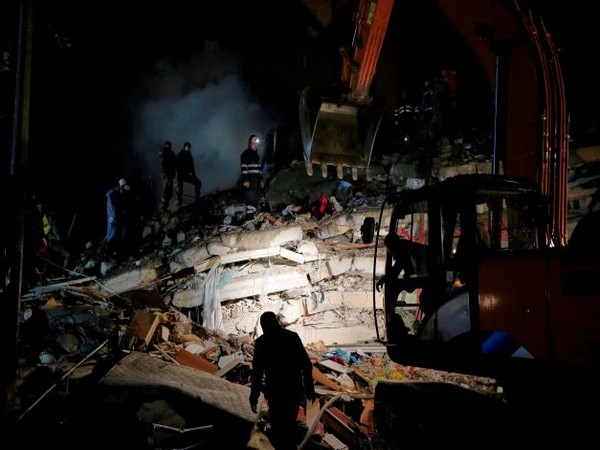WRAPUP 3-Death toll from earthquake in Turkey nears 3,000, rescuers search for survivors
Rescue teams worked early on Tuesday to release people trapped in the rubble of buildings in southern Turkey as the death toll in the country from a devastating earthquake a day earlier rose to nearly 3,000. The magnitude 7.8 quake hit Turkey and neighbouring Syria early on Monday, toppling entire apartment blocks, wrecking hospitals, and leaving thousands more people injured or homeless.

Rescue teams worked early on Tuesday to release people trapped in the rubble of buildings in southern Turkey as the death toll in the country from a devastating earthquake a day earlier rose to nearly 3,000.
The magnitude 7.8 quake hit Turkey and neighbouring Syria early on Monday, toppling entire apartment blocks, wrecking hospitals, and leaving thousands more people injured or homeless. Nearly 8,000 people have been rescued from 4,758 buildings destroyed in the tremors a day earlier, Turkey's Disaster and Emergency Management Authority (AFAD) said in its latest statement.
AFAD head Yunus Sezer said that 2,921 people had died in Turkey as aftershocks continued to shake the region. Another earthquake of 5.6 magnitude struck central Turkey on Tuesday, the European Mediterranean Seismological Centre (EMSC) said. Freezing winter weather hampered search efforts for survivors through the night. A woman's voice was heard calling for help under a pile of rubble in the southern province of Hatay. Nearby, the body of a small child lay lifeless.
Weeping in the rain, a resident who gave his name as Deniz wrung his hands in despair. "They're making noises but nobody is coming," he said. "We're devastated, we're devastated. My God ... They're calling out. They're saying, 'Save us,' but we can't save them. How are we going to save them? There has been nobody since the morning."
Temperatures fell close to freezing overnight, worsening conditions for people trapped under rubble or left homeless. In Kahramanmaras, north of Hatay, entire families gathered around fires and wrapped themselves in blankets to stay warm.
"We barely made it out of the house," said Neset Guler, huddled around the fire with his four children. "Our situation is a disaster. We are hungry, we are thirsty. It's miserable." The earthquake, which was followed by a series of aftershocks, was the biggest recorded worldwide by the U.S. Geological Survey since a tremor in the remote South Atlantic in August 2021.
It was the deadliest earthquake in Turkey since a quake of similar magnitude in 1999 that killed more than 17,000. Nearly 16,000 were reported injured in Monday's quake. At least 1,444 people were killed in Syria and about 3,500 injured, according to figures from the Damascus government and rescue workers in the northwestern region controlled by insurgents.
Poor internet connections and damaged roads between some of the worst-hit cities in Turkey's south, homes to millions of people, hindered efforts to assess and address the impact. Turkish President Tayyip Erdogan, preparing for a tough election in May, called the quake a historic disaster and said authorities were doing all they could.
"Everyone is putting their heart and soul into efforts although the winter season, cold weather and the earthquake happening during the night makes things more difficult," he said. He said 45 countries had offered to help the search and rescue efforts. In the Turkish city of Iskenderun, rescuers climbed an enormous pile of debris that was once part of a state hospital's intensive care unit in search of survivors. Health workers did what they could to tend to the new rush of injured patients.
"We have a patient who was taken into surgery but we don't know what happened," said Tulin, a woman in her 30s, standing outside the hospital, wiping away tears and praying. In Syria, the effects of the quake were compounded by the destruction of more than 11 years of civil war.
A top U.N. humanitarian official said fuel shortages and the harsh winter weather were also creating obstacles to its response. "The infrastructure is damaged, the roads that we used to use for humanitarian work are damaged, we have to be creative in how to get to the people ... but we are working hard," U.N. resident coordinator El-Mostafa Benlamlih told Reuters in an interview via video link from Damascus.
In the government-controlled city of Aleppo, footage on Twitter showed two neighbouring buildings collapsing one after the other, filling streets with billowing dust. Two residents of the city, which has been heavily damaged in the war, said the buildings had fallen in the hours after the quake, which was felt as far away as Cyprus and Lebanon.
Raed al-Saleh of the Syrian White Helmets, a rescue service in rebel-held territory known for pulling people from the ruins of buildings destroyed by air strikes, said they were in "a race against time to save the lives of those under the rubble."
(This story has not been edited by Devdiscourse staff and is auto-generated from a syndicated feed.)










